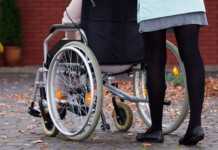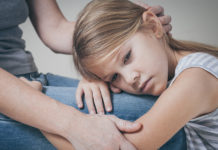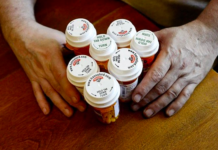Temperamentally Blessed
From Aeon: The finding that only one in five people avoid any kind of mental health problems or psychiatric diagnoses through their lives has prompted...
What About Fat Voices? Our Experience With Fat Invisibility
In this piece for Resilient Fat Goddess, psychologist and fat activist Rachel Millner critiques the pervasiveness of fatphobia, sizeism, and weight bias within the eating...
Xanax: Children As Young As 11 Taking Anxiety Drug
From BBC: The abuse of the anti-anxiety drug Xanax is becoming widespread among children and adolescents as young as 11 years old.
"To gain an idea of the...
Psych Ward Ramblings
In this piece for Medium, activist and survivor Louisa J. Harvey describes the experience of being locked in a psychiatric institution on an involuntary hold.
"This is not...
The Never-Ending Misuse of Antipsychotics in Nursing Homes
From Health Affairs: Although the problem of antipsychotic misuse in nursing homes has been raised to policymakers numerous times over the past six decades, the...
What Care for the Criminally Insane Can Teach Us
In this piece for The Pew Charitable Trusts, Michael Ollove reports on Oregon's model of intense care and supervision for those found guilty except for insanity.
"Oregon’s model...
A Commentary on the Finnish Analysis of Outcomes of First Episode Schizophrenia
There are a number of well-recognised problems with this sort of study and we should be very cautious about accepting its conclusions at face value. The main problem is that it is an ‘observational’ study, not a randomised controlled trial, and these analyses can be seriously misleading.
20-year Outcomes for First-episode Psychosis: Impact of Neuroleptic Drug Discontinuation
The authors conclude that the risk of treatment failure or relapse after discontinuation of antipsychotics does not decrease during the first eight years of illness, and that long-term antipsychotic treatment is associated with increased survival. This is a sobering finding and the paper warrants careful review.
Usage of Depression Pills Almost Halved Among Children in Denmark
After a number of years with a steadily increasing sales curve, the number of children and adolescents in treatment with depression pills decreased by 41% in Denmark. Despite this welcome development, pharmaceutical companies and psychiatry professors continue to deceive the population and deny the facts about these drugs.
New Meta-Analysis: Mindfulness Interventions Effective for Psychiatric Disorders
A meta-analysis of mindfulness-based interventions shows efficacy for treating depression, physical pain, smoking, and addictive disorders.
Social Support Improves Antipsychotic Discontinuation, Study Finds
A new study explores how people manage to discontinue antipsychotic medication and examines how social supports may improve outcomes.
Call for Client Inclusion in Recovery-Focused Psychiatric Diagnosis
A new review, published in The Lancet Psychiatry, examines the perspectives of clinicians and service-users on psychiatric diagnosis.
Antidepressant Use Leads to Worse Long Term Outcomes, Study Finds
Results from a 30-year prospective study demonstrated worse outcomes for people who took antidepressants, even after controlling for gender, education level, marriage, baseline severity, other affective disorders, suicidality, and family history of depression.
The Unsung Psychiatric Impact of Strep Throat
A sea change is needed in the evaluation of children with perceived psychological disturbances. Parents are told that their child has a fictitious biochemical imbalance in the brain while real medical disorders are overlooked. In our family's case, it was Pediatric Autoimmune Neuropsychiatric Disorder Associated with Strep (PANDAS).
The Unique Way the Dutch Treat Mentally Ill Prisoners
In this piece for BBC, Melissa Hogenboom reports on the way that people who have been convicted of crimes and diagnosed with mental illness are...
Experts ‘In Denial’ Over Withdrawal Harm From Prescription Pills
From The Herald: MSP (Member of the Scottish Parliament) Michelle Ballantyne has spoken out about the epidemic of withdrawal effects of prescription pills, critiquing physicians'...
Antidepressant Use Linked to Higher Dementia Risk
From The Telegraph: A major new study has found a strong association between long-term exposure to antidepressants and risk of dementia.
"Researchers warned there may be...
Researchers Explore the Relationship Between Religiosity and Psychotic Experiences
Individuals who identify as religious may be more likely to have symptoms associated with psychosis.
Primary Care Practitioners May Mistake Irritability as Bipolar Disorder in Youth
Family medicine and pediatric providers are less confident in their assessment of irritability in youth than psychiatric providers, which may lead to overdiagnosis of bipolar disorder.
Do Social Network Sites Help or Harm Well Being?
How does social network site use influence well-being? Researchers suggest this depends on the extent to which site use is “connection-promoting."
Here’s How to Beat Anxiety Without Medication
From The Independent: The medication that is frequently prescribed to treat anxiety often does not work in the long-term. According to a new study, a variety...
Effort to Tackle Overuse of Antipsychotics in Older Adults Backfires
A partnership designed to decrease antipsychotic use in elderly patients may have led to increased use of medications with even worse risk/benefit profiles.
The Breaking Point
How did I become someone who could barely function? I was a high-performing sales executive ranked in the top 2% of an international business communications company. But now, after using powerful psych meds for depression and anxiety for more than a decade, I couldn’t do basic things like go to the grocery store, plan a meal, make dinner, or get together with friends.
Antidepressants and Withdrawal: Readers Tell Their Stories
More than 8,000 people responded to the recent New York Times article on antidepressant withdrawal. Here, reporter Benedict Carey describes differences in the way various...
On Being Mad in Public
Even as you are being shown amazing and mystical things and having all sorts of mysteries clarified in your mind, you are also being placed in a position where no one will pay any attention to what you have to say, or if they do, the results of that attention will be negative (such as being locked up). The mysterious and powerful journey you are on is almost invisible to other people.

































